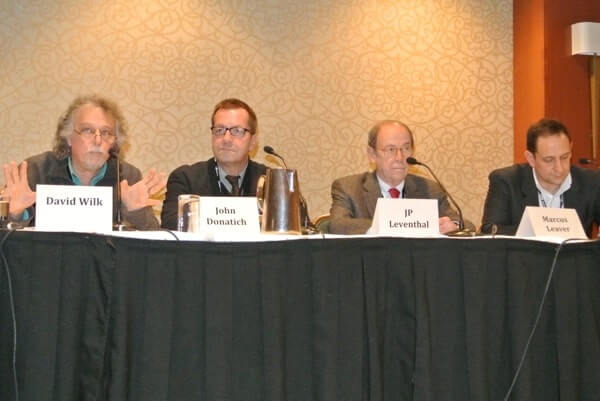

At the Digital Book World conference in New York, four great minds have come together to talk about the future of illustrated books.
John Donatich, Director, Yale University Press was the first speaker and said “When we look at the range of our publishing activities in all four of our lines, only about 7% of the business involves eBooks. Trade aspect is 15% and the scholarly portion is very small. The problem with art books is that we still haven’t figured out what a digital art books wants to be. We need to have a creative spark to figure this out. It will be different than trade books, where we just take content and dump it into a program. We can’t just simply import the content of a hardback book into a digital device. The big question is: Is there a market for art books and a market that wants the book to be enhanced? This creates an argument to be made for print, as opposed to digital, enhancements. The technology doesn’t exist to use digital books in the same way that scholars use them—lay out 10 books on a table and peruse all of them at the same time. Getting licensing rights to digitize images is hard and very expensive. There are any huge questions still unanswered. For example, what if an ebook has a link to an image on a site? Who pays royalties for that image? How much?
Marcus Leaver, CEO, The Quarto Group then said that “the tangible book is pretty good technology and we don’t have to digitize everything that moves. Treat each imprint differently and look at what works. Some imprints have digitized 100% of their list and for others have less than 20% because it doesn’t fit the imprint. But we are learning more all the time. The top three ebooks come from three completely different parts of the business. There cannot be a hard and fast rule about what does and does not work. The US has 4% digital sales, and in the UK it is about 2% digital sales. 60% is Kindle, 10% NOOK, and 10% Apple sales. If Apple gets bigger, there may be a market there and room to grow. It is hard to get the backlist digitized because some imprints have been in business a long time and getting the rights is hard. Getting the licensing rights to images or to backlist titles to put them into an ebook is still a huge and expensive issue.”
When traveling back to the UK for the holidays Marcus noticed that there was a great rush to get tablets out, but they were very poorly marketed and sales were slow. Take the NOOK, for example. “By 2020, I would be happy if 20% of my business was digital and don’t expect it to go higher.
JP Leventhal, President, Black Dog & Leventhal Publishers: There are three categories of illustrated books: linear books, where most sales are; information books, available in chunks, like a cookbook; third is a book that is an object in itself. Most of our books are in the second and third categories, and these are the hardest to translate into digital. Apps are incredibly expensive. In 2012, dollar volume in ebooks went up 211% over 2011. Units went up 250%. Overall, our business is about 4% digital and that includes the iPad book The Elements. The real question is how to price the ebook versions and I don’t know the answer to it. One of the ways they are overcoming a shrinking marketplace is to do fewer books, but become more focused. If illustrated books are sold at $2.99, there is no business there. If they sell for $15, then maybe you can make a business out of it.
David Wilk, President, Booktrix, Moderator: Shelf space for illustrated books has been reducing over the last years, but we now have new platforms and new machines. Over 240 million tablets will be sold this year. Abrams market penetration for digital revenue is in the 4% range overall.
